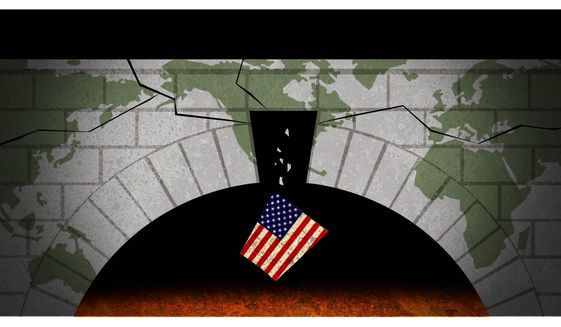A Rush to Fill the Power Vacuum
By Darrell Issa
WashingtonTimes.com

Illustration on the dangerous void left by America’s
leadership vacuum in world affairs by Alexander
Hunter/The Washington Times
For every nuanced policy argument over isolationism versus interventionism, the unavoidable truth — however unpleasant it may be — is this: If the United States is not the world’s foremost power, someone else will be. And the story of the Obama administration’s foreign policy doctrine consists of example after example of President Obama choosing to disengage from the rest of the world, leaving behind a power vacuum that various bad actors have been more than eager to fill. His latest foreign policy initiative, a deal to lift sanctions against Iran in exchange for a pause in their nuclear weapons development, is no exception and spells bad news for America and her allies.
The first six months of Mr. Obama’s presidency were spent circling the globe on an apology tour seeking forgiveness for the “darker period in our history,” throughout which “America has shown arrogance” and gone “off course” by “sacrificing [our] values.” During this same time, he dispatched Secretary of State Hillary Clinton to Geneva with a bright, red “reset” button to make peace with the Russians, quickly caving to their demands by canceling our missile defense system in Eastern Europe. This betrayal of our allies in pursuit of finding common ground with an obvious adversary would be a harbinger of things to come. It wouldn’t take long before the administration announced its “pivot” to Asia, making official what the world had long suspected: America no longer had an interest in Europe or the Middle East.
By late 2011, Mr. Obama had abandoned the Iraqi military, which was still heavily dependent upon American logistics and intel support, thereby severely weakening its ability to defend the country and creating what would become a virtual black hole for the U.S. intelligence community. It should have come as no surprise that ISIS marched nearly unimpeded to Baghdad’s doorstep after gaining its strength from President Bashar Assad’s abhorrent and unchecked use of chemical weapons against the Syrian people. What’s more is that Mr. Assad’s use of chemical weapons was supposed to have represented a “red line” for Mr. Obama, but it instead signified yet another opportunity to remain decisively on the sidelines. Mr. Putin, the Iranians and even North Korea clearly interpreted these actions as weakness on the part of the United States and have taken every opportunity to exploit Mr. Obama’s lack of resolve.
At no point has this president come to the realization that Russia — which he laughed off as a threat during an election debate just a few years ago — is not a partner for peace, but a threat to it. Thus, almost three years into his second term, Russia has both annexed Crimea and begun a full-scale invasion of mainland Ukraine. The United States and, ironically, Russia are obligated to protect Ukraine’s territorial integrity in exchange for nuclear disarmament under the Budapest Memorandum, an agreement which the United States has failed to honor under this administration. Russia has even agreed to sell its S-300 air defense system toIran right on the heels of what was supposed to have been a landmark agreement to affirmatively stop its nuclear program. Over just the past few weeks, Mr. Putin has openly challenged the U.S. by deploying military assets to Syria in support of Mr. Assad, signing an intel-sharing agreement with Iran, Iraq and Syria, and declaring the U.S. training of the moderate Syrian opposition illegal.
Even Mr. Obama agrees that the Irandeal will empower the world’s foremost state sponsor of terrorism. Despite its 37 years of reckless behavior and support for the likes of Hezbollah in Lebanon, Mr. Assad in Syria, and Houthi militants in Yemen, Mr. Obama’s agreement will reward Iran with more than $100 billion almost immediately, access to conventional arms in five years, ballistic missile technology in eight years, and an unfettered path to the bomb in 10 to 15 years. This is the same nation that held 52 American diplomats hostage for 444 days and facilitated the bombing of over 200 U.S. servicemen in Beirut.
Even though the Iranian regime today has made abundantly clear that it has no intention of changing its ways, the president admits that his “deal” only delays the inevitable while pushing the problem’s ultimate resolution onto a future administration. He has reminded Congress “that you don’t make deals like this with your friends,” but this agreement is a windfall for the Iranian regime representing almost a third of its yearly economic output. It is unconscionable that my colleagues in Congress would allow it to pass and sanctions on Iran to be lifted in exchange for a scheme that offers only short-term limitations on nuclear enrichment while failing to secure unfettered “anytime, anywhere” inspections. This is the best possible outcome the Iranians could have hoped for and congressional Democrats, for the most part, cannot seem to read the writing on the wall and vote their conscience over their party
For President Obama, Iran clearly represents what he hopes will be the marquee accomplishment of his foreign policy, but if Russia and Syria have taught us anything, Iran will be the exclamation point on its failure.
• Darrell
Issa, a California Republican, is a member of the
House Foreign Relations Committee.

